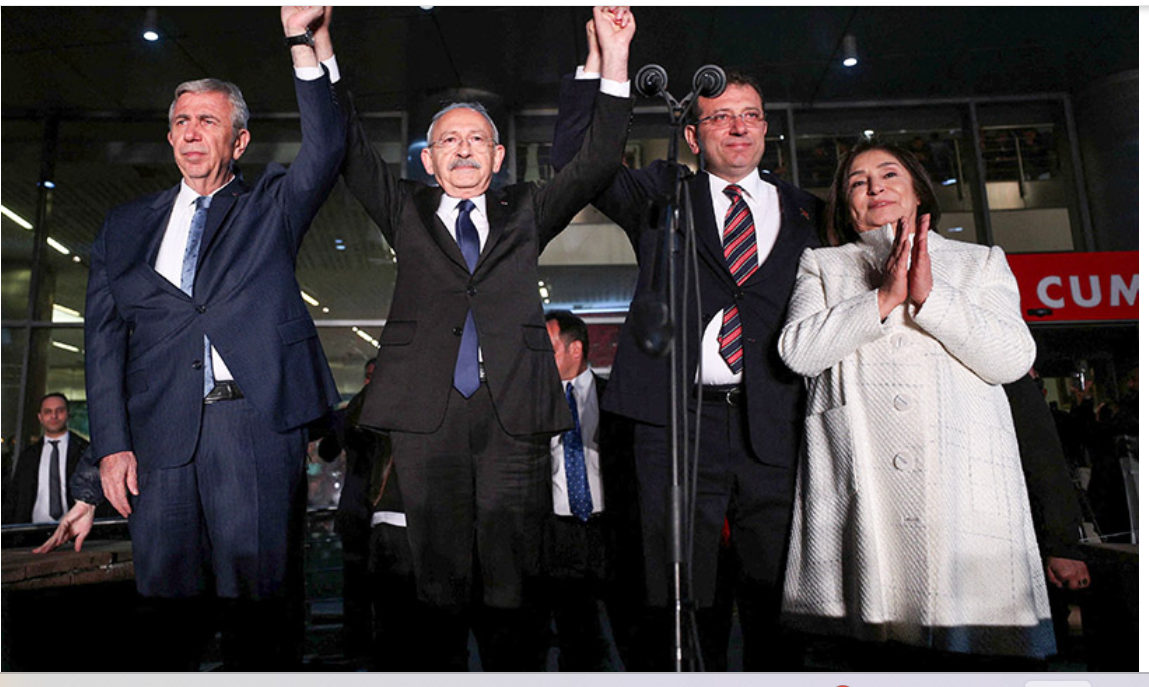“These elections are going to change our lives”. These are the words of several young Turks with regard to the upcoming elections in Turkey scheduled for 14 May, just one month from today. These elections are fundamental for the country’s future, as they could consolidate the totalitarian turn driven by the current president, Recep Tayyip Erdogan, or, on the contrary, chart a new horizon for the Eurasian nation, reports Atalayar.com.
Turkish society is looking forward to these elections which, according to the polls, are expected to be very close. Erdogan does not have it as easy as when he came to power in 2003 as Prime Minister. The critical economic situation, his authoritarian drift, as well as the response to the recent earthquake that hit the southeast of the country have placed the current Turkish leader in a delicate position ahead of the May elections.
Part of the opposition, aware of this situation and the possibilities for change, has organised and united in a front against Erdogan. This coalition, called the Table of Six, is led by Kemal Kiliçdaroglu, leader of the secular, centre-left Republican People’s Party (CHP). The CHP – founded by the father of the Turkish Republic, Mustafa Kemal Atatürk – is the country’s oldest party and the main opposition party.
Also within this alliance are Meral Aksener’s Iyi Party, Ali Babacan’s Democracy and Progress Party (DEVA), Gültekin Uysal’s Democrat Party, Temel Karamollaoglu’s Happiness Party and Ahmet Davotoglu’s Future Party. These formations are located at different points on the political spectrum and represent different ideologies. However, they all have a common goal: to oust Erdogan from power.
“We are very close to overthrowing the tyrants’ throne”, declared Kiliçdaroglu after being elected to head the coalition. The CHP leader has promised to govern Turkey “with consultation and consensus”. “Our table is the table of peace. Our goal is to lead the country to prosperity, peace and joy,” the 74-year-old politician was quoted as saying by Reuters.
“They seem to have formed a strong alliance, which is quite remarkable and unprecedented given the divisions inherent in Turkish politics,” Shivan Fazil, a research fellow at the Stockholm International Peace Research Institute (SIPRI), told Atalayar.
The Table presents itself as “an alternative political platform”. “They have promised to restore a ‘strengthened’ parliamentary system, the rule of law, more freedom, and to abolish the executive presidential system that gave uncontrollable power to President Erdogan,” Fazil notes.
Apart
from Erdogan and the coalition led by Kiliçdaroglu, the other two presidential candidates are Muharrem Ince and Sinan Ogan. Ince, a former CHP member, now leads the Fatherland Party, while Ogan leads the far-right Nationalist Action Party (MHP). Both have been criticised for favouring Erdogan as they split the opposition vote by not being part of Kiliçdaroglu’s alliance, making it difficult for him to win in the first round.
Should none of the presidential hopefuls win 50% of the vote on 14 May, Turks will return to the polls two weeks later to choose between the two candidates with the most votes in the first round.
Kiliçdaroglu, in addition to the political parties of the alliance, has the backing of the popular mayors of Istanbul and Ankara, Ekrem Imamoglu and Mansur Yavas, respectively, who could become vice-president in the event of a Kiliçdaroglu victory at the polls.
Even the country’s pro-Kurdish political formation, the Peoples’ Democratic Party (HDP) – and the third largest in parliament – has publicly announced its support for the CHP leader. “Our clear expectation is a transition to a strong democracy. If we can reach agreements related to fundamental principles, we can support him in the presidential elections,” said HDP co-chair Mithat Sancar.
“The Kurdish vote could prove vital in tipping the balance in favour of the opposition,” said Fazil, noting that the HDP has chosen not to nominate its candidate in order to avoid splitting the opposition vote. “The undecided Kurdish votes proved crucial in helping the opposition win key races in Istanbul and Ankara during the 2019 local elections,” says the SIPRI researcher.
Valeria Scuto, senior analyst for the Middle East and North Africa at Sibylline, agrees, and believes that the pro-Kurdish HDP party ‘will play a crucial role’ in the May elections.
Despite the importance of this political formation, the HDP is facing numerous political pressures from Ankara. “In January, part of the money that the party receives from the state to finance its election campaign was frozen,” adds Fazil.
Another challenge facing the pro-Kurdish party is the imprisonment of one of its most well-known and charismatic leaders, Selahattin Demirtas, who has been in prison since 2016. However, Demirtas is not the only political prisoner in the country. One of the key points of Erdogan’s authoritarian drift has been the detention of journalists, activists and politicians.
The role of activists and journalists is key in a country where human rights are regressing by leaps and bounds. LGTBI+ and women’s rights are being targeted by an increasingly conservative and religious government. In this regard, it is worth highlighting Turkey’s exit in 2021 from the Istanbul Convention, an international treaty that establishes a legal framework against gender-based violence.
Erdogan has tried to shield his image and power by silencing criticism and opposition. Even the mayor of Istanbul, Imamoglu, was sentenced to two years and seven months in prison in December and politically disqualified for insulting the election commission in 2019. Imamoglu had emerged as a strong rival to Erdogan in the upcoming elections.
Excerpt only
Follow our English language YouTube videos @ REAL TURKEY: https://www.youtube.com/channel/UCKpFJB4GFiNkhmpVZQ_d9Rg
And content at Twitter: @AtillaEng
Facebook: Real Turkey Channel: https://www.facebook.com/realturkeychannel/
